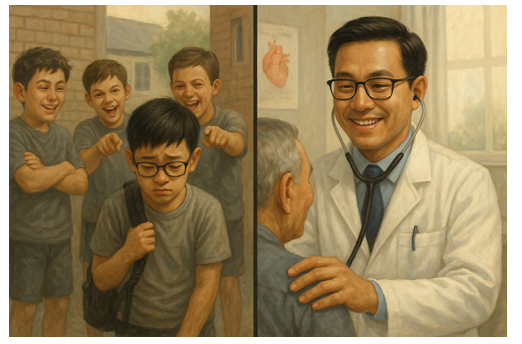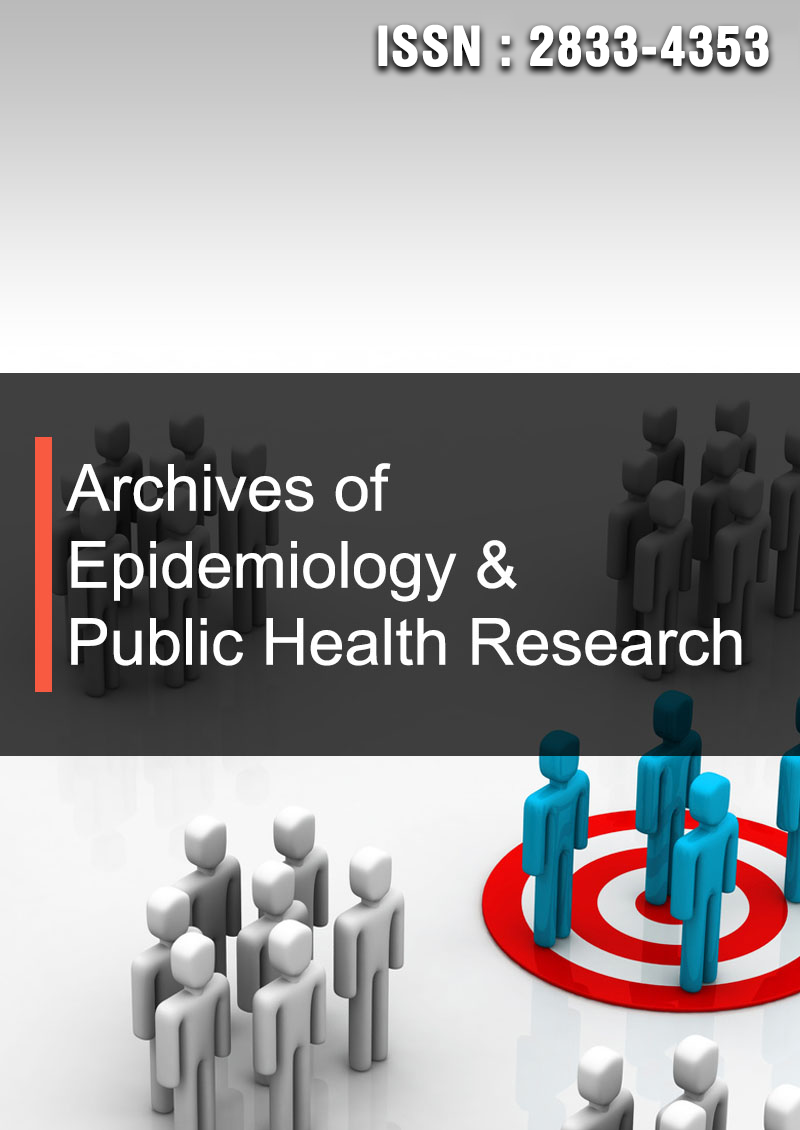Perspective Article - (2025) Volume 4, Issue 2
What Was Meant for Harm. A Testimony of Healing, Faith, and Medical Revolution
2Indonesian College of Lifestyle Medicine, Indonesia
3Department of Cardiology, Faculty of Medicine, Prima University, Medan, Indonesia
Received Date: Apr 10, 2025 / Accepted Date: May 12, 2025 / Published Date: May 20, 2025
Copyright: ©2025 Dasaad Mulijono. This is an open-access article distributed under the terms of the Creative Commons Attribution License, which permits unrestricted use, distribution, and reproduction in any medium, provided the original author and source are credited.
Citation: Mulijono, D. (2025). What Was Meant for Harm. A Testimony of Healing, Faith, and Medical Revolution. Arch Epidemiol Pub Health Res, 4(2), 01-05.
Abstract
In a world where the cruelty of discrimination and the silence of complicity still haunt the corridors of medical education, some stories break through the darkness—not with anger but with radiant love. This is the story of Prof. Dasaad Mulijono (DM), a minority physician in Indonesia who rose from the ashes of ethnic persecution and systemic rejection to become a beacon of healing, innovation, and faith-driven excellence.
Born into a world that tried to erase his worth, Prof. DM endured bullying, exclusion, and institutional prejudice throughout his formative years. Yet rather than yielding to bitterness, he chose forgiveness; instead of retreating, he advanced with unstoppable courage. Guided by unshakable faith, Prof. DM turned every insult into fuel for his purpose, ultimately ascending to the highest academic honours and becoming a pioneer in interventional cardiology and lifestyle- based medicine.
While many withdrew in fear at the height of the COVID-19 pandemic, Prof. DM stepped forward in love. With the bold integration of Whole Food Plant-Based Diets (WFPBD) and advanced cardiology, he saved thousands of lives, patients deemed untreatable by conventional standards. His leadership redefined clinical outcomes and embodied a profound spiritual truth: that suffering, when met with compassion and conviction, can become a sacred path to transformation.
Prof. DM’s story is a personal triumph, moral testimony, and call to action. It urges institutions to no longer see marginalized individuals through a deficit lens but to recognize the resilience forged in adversity. Most critically, it demands that discrimination and bullying be confronted and eradicated from all levels of medical training forever. This article bears witness to the hidden suffering of many and honours those whose silent tears never made headlines. For every life changed by Prof. DM, there are countless others whose potential was crushed under the weight of systemic injustice. Let this story stir hearts and awaken consciences to build a future where excellence is nurtured by love, not hindered by hate.
Keywords
Discrimination, Persecution, Medical History, Minority Excellence, Post-Traumatic Growth, Chinese Indonesian, Psychology of Resilience, Biblical Theology, Professional Development, Medical Ethics.
Introduction
Injustice has a long and painful presence in human history, often associated with trauma, exclusion, and loss. Yet paradoxically, oppression has also given rise to individuals whose contributions have shaped society in transformative ways. In medicine, the stories of physicians who faced systemic barriers — whether due to gender, race, ethnicity, or social class — consistently reveal patterns of exceptional perseverance, empathy, and impact.
While discrimination is ethically unacceptable and must be eradicated, this article highlights how individuals who endure such trials often develop unique psychological and moral qualities contributing to later excellence. Drawing on historical examples, psychological insights, and spiritual wisdom, this paper frames injustice as a crisis of humanity and a crucible for greatness.
Historical Cases of Excellence Born from Oppression
Dr. Elizabeth Blackwell (1821–1910)
As the first woman in the United States to receive a medical degree, Dr. Blackwell faced severe gender-based discrimination. Accepted into medical school as a joke, she endured bullying and social exclusion from classmates and faculty alike. However, she graduated first in her class and established the New York Infirmary for Indigent Women and Children, pioneering women's healthcare and education.
Dr. Charles R. Drew (1904–1950)
Drew, a brilliant African American surgeon, revolutionized blood storage and transfusion, laying the foundation for modern blood banks. Despite his groundbreaking contributions, Drew encountered racial barriers throughout his career, including segregated medical policies. He used these injustices to motivate young Black physicians and advocate for ethical medical practices.
Dr. Helen Rodríguez-Trías (1929–2001)
Growing up in a Puerto Rican immigrant family, Rodríguez-Trías experienced both ethnic discrimination and gender bias. Her early experiences fuelled a passion for public health, leading her to champion reproductive rights and paediatric care for underserved populations. She became the first Latina president of the American Public Health Association, embodying leadership shaped by personal struggle.
Minorities in Indonesia
In countries like Indonesia, minority populations, generally due to different ethnicities or religions, have endured generations of systemic exclusion, ranging from business restrictions and citizenship barriers to violent anti-minority pogroms. Despite this, minority Indonesians have demonstrated extraordinary levels of achievement in medicine. Many became respected physicians, researchers, and hospital founders. Their success, achieved often without state support, highlights the deep resilience and communal determination forged through hardship.
Their stories often go untold, yet their legacy speaks volumes: from family clinics in rural villages to leading cardiology and oncology centres, many minority Indonesian doctors outperformed their majority peers in academic rigor and patient-centred care. What was meant to suppress, paradoxically cultivated excellence.

The true story of Prof. DM
Prof. DM's extraordinary life is an inspiring testament to the power of resilience forged in the crucible of adversity. Born into a minority background in Indonesia, he endured discrimination and persecution from his earliest days. Yet rather than succumbing to bitterness or despair, he courageously transformed every hardship into a beacon of excellence. Through unrelenting determination, he consistently ranked as the top student throughout his education. He eventually earned national recognition by achieving the highest score in Indonesia’s entrance examination to the esteemed University of Indonesia. There, his brilliance shone even brighter as he graduated summa cum laude, emerging as the top medical student.
Driven by an insatiable passion for knowledge, Prof. DM pursued advanced training in Australia, breaking barriers to becoming the first Indonesian physician to achieve Australian specialist qualifications in internal medicine, cardiology, and interventional cardiology. He further distinguished himself by completing a PhD and rigorous postdoctoral studies in molecular biology, setting a new standard of excellence and dedication.
Returning to Indonesia amidst the unprecedented chaos of the COVID-19 pandemic, Prof. DM swiftly became a beacon of hope and healing, fearlessly stepping forward when others retreated. From as early as February 2020—before vaccines or proven medications existed—he began courageously treating COVID-19 patients, ultimately saving over 3,500 lives, each struggling with multiple severe comorbidities, through an innovative WFPBD therapeutic approach. In May 2020, when the Indonesian Doctors Association permitted physicians over 50 to isolate at home, Prof. DM, then aged 55, refused to abandon his patients, guided by an unwavering commitment to the Hippocratic Oath and an immense love for humanity. Ironically yet unsurprisingly, those who once bullied and discriminated against him chose to hide during the crisis. Yet Prof. DM stood firm, empowered by his profound faith and unwavering belief that God would protect him.
Indeed, his spiritual faith guided him toward discovering the miraculous healing potential of the WFPBD, which remarkably prevented the loss of any of his COVID-19 patients. As Indonesia’s pioneering advocate and practitioner of WFPBD in clinical cardiology, Prof. DM has dramatically reversed countless devastating illnesses, including hypertension, diabetes, obesity, dyslipidaemia, chronic kidney disease, and even severe atherosclerosis. His revolutionary integration of Drug-Coated Balloon (DCB) therapy with WFPBD achieved a groundbreaking restenosis rate of only 2%, vastly outperforming the national average of 10–20%.
Prof. DM’s remarkable journey vividly illustrates how faith, perseverance, and unwavering purpose can transform profound suffering into powerful healing, turning personal trials into national triumphs and global inspiration.
The Face of Betrayal
He wore the white coat proudly, a symbol of his sacred vow to heal, care, and treat every soul as brother, as sister. Yet behind polished smiles, his eyes grew cold and calculating. The warmth of his promise faded, replaced by quiet disdain, etched deep into the lines of his brow. In public, he spoke the language of compassion, reciting oaths with practiced ease. But in the quiet corridors, his true face emerged the face that judged, excluded, wounded without a blade. He was meant to be a brother in healing, but became a stranger in practice, his heart was a silent witness to the oath he chose to betray.
Every doctor in Indonesia must take an oath, and one of the most striking parts is that a doctor should treat fellow doctors as siblings.

Psychological Discussion: The Science of Post-Traumatic Growth
The phenomenon of individuals thriving after trauma is well- documented in psychological literature as post-traumatic growth (PTG). According to Tedeschi and Calhoun (1996), PTG is characterized by increased personal strength, appreciation of life, improved relationships, and a deepened sense of purpose. Unlike resilience, which is the ability to “bounce back,” PTG implies transformation — a person becomes fundamentally changed, often positively. Chronic exposure to discrimination or marginalization can foster a high degree of grit (Duckworth, 2007), a psychological trait associated with long-term achievement. Such individuals also develop heightened empathic intelligence, likely due to their experiences of pain and exclusion. From a developmental standpoint, oppression creates high-pressure conditions that, while undesirable, mimic the environment in which diamonds form: under pressure, heat, and time. Like fire refines metal, psychological stress can lead to lasting internal transformation when accompanied by meaning, support, and inner strength.
Biblical and Theological Perspective: Refined Like Gold
Spiritual traditions have long recognized the transformative power of suffering. The Bible offers a theological framework that resonates deeply with the narratives explored above:
"These trials will show that your faith is genuine. It is being tested as fire tests and purifies gold, though your faith is far more precious than mere gold."
— 1 Peter 1:7 (NLT)
"You intended to harm me, but God intended it for good to accomplish what is now being done, saving many lives."
— Genesis 50:20 (NIV)
In Scripture, persecution is not a sign of divine absence but of divine preparation. Joseph’s betrayal led to national deliverance. Esther’s minority status positioned her to rescue her people. The narrative of suffering followed by exaltation is foundational to the Judeo-Christian worldview.
Moreover, faith-based resilience offers coping mechanisms and a transformative purpose: to turn injustice into a mission. Followers of Christ are called to respond not with vengeance but with love and forgiveness:
"But I tell you, love your enemies and pray for those who persecute you."
— Matthew 5:44 (NIV)
"Do not repay anyone evil for evil… Do not take revenge, my dear friends, but leave room for God's wrath, for it is written: 'It is mine to avenge; I will repay,' says the Lord."
— Romans 12:17,19 (NIV)
Jesus made clear that discipleship involves sacrifice and suffering: "Whoever wants to be my disciple must deny themselves, take up their cross, and follow me."
— Matthew 16:24 (NIV)
"Blessed are those who are persecuted because of righteousness, for theirs is the kingdom of heaven."
— Matthew 5:10 (NIV)
This theological lens reframes hardship as an invitation to deeper faith, a crucible of character, and a pathway to serve others through redemptive love.
Implications for Medical Education and Policy
Understanding the developmental power of adversity has profound implications for how we educate, mentor, and evaluate future medical professionals. Rather than viewing marginalized students as liabilities or “at risk,” institutions must begin recognizing the potential for excellence born through adversity.
• Admissions Reform: Holistic review processes should factor in adversity and resilience.
• Mentorship Programs: Targeted mentorship for minority and persecuted populations can unlock leadership potential.
• Narrative Medicine: Encouraging students to reflect on their stories can promote healing, identity formation, and compassion.
• Cultural Competency: A deeper appreciation of historical oppression can foster inclusive medical practice and patient care.
Conclusion: From Ashes to Excellence
The journeys of Elizabeth Blackwell, Charles Drew, Helen Rodríguez-Trías, and countless others—including the modern- day example of Prof. DM—reveal a profound truth: greatness often emerges not despite adversity, but because of it. These individuals transformed wounds into wisdom, rejection into resilience, and injustice into innovation. In Prof. DM’s case, ethnic discrimination could have become a lifelong burden. Instead, it became the foundation for a life marked by academic excellence, groundbreaking medical contributions, and compassionate leadership.
Recognizing this pattern should reshape how we think about medical education, leadership, and social equity. Institutions must move away from a deficit-based view of marginalized individuals and begin to honour the strength forged in adversity. Discrimination must be eradicated—but while it still exists, we must acknowledge that, with the proper support—community, purpose, and faith—it can become a crucible from which remarkable leaders emerge.
This article also offers a spiritual and psychological reframing of suffering, not as a dead end, but as a passage. In the biblical tradition, trials are not wasted; they refine forces that strengthen and prepare individuals for a greater purpose. As the apostle Peter writes, faith tested through fire is more precious than gold. Prof. DM’s story echoes this truth: what was meant to suppress him became the fire that refined him into a healer, reformer, and pioneer.
The message is clear for young professionals facing bullying, discrimination, or exclusion: your pain has meaning. When met with courage, compassion, and a sense of calling, your struggle can become the seed of something greater than you ever imagined. Through resilience, grace, and love, what was intended for harm can be transformed into a life that heals others and changes the world.
Let us be clear: this writing does not justify or excuse the cruelty of bullying and discrimination—ugly behaviours that are deeply unjust and against the heart of God. Our moral responsibility is to confront and eradicate such injustice so that future generations no longer endure the suffering we have seen. While our story may testify to divine help and resilience, we must also remember the many others—young doctors and students—whose dreams were crushed, whose mental health was damaged, and whose families were broken by the weight of relentless prejudice. May this reflection testify to hope and a call to action for justice, healing, and recognizing the divine potential within every life.
References
1. Tedeschi, R. G., & Calhoun, L. G. (1996). The Posttraumatic Growth Inventory: Measuring the positive legacy of trauma. Journal of traumatic stress, 9, 455-471.
2. Duckworth, A. L., Peterson, C., Matthews, M. D., & Kelly, D. R. (2007). Grit: perseverance and passion for long-term goals. Journal of personality and social psychology, 92(6), 1087.
3. Frankl, V. (1984). Man’s Search for Meaning. Beacon Press.
4. Baranowsky, A. B., & Gentry, J. E. (2015). Trauma practice: Tools for stabilization and recovery. Hogrefe Publishing.
5. Blackwell, E. (2023). Pioneer work in opening the medical profession to women. Rowman & Littlefield.
6. Posner, K.L. (2012). Hidden Heroes: Chinese-Indonesian Physicians and the Quiet Legacy of Compassion. Southeast Asian Medical Journal, 22(4), 211–219.
7. International Bible Society. (1997). The Holy Bible: New International Version. Broadman & Holman.
8. Mulijono, D., Hutapea, A. M., Lister, I. N. E., Sudaryo, M. K., Umniyati, H. (2024). Plant-Based Diets and Supplements in Mitigating COVID-19: Part 1. The Research Report. J Comm Med and Pub Health Rep 5(08): https://doi.org/10.38207/ JCMPHR/2024/MAY05080572/A
9. Mulijono, D., Hutapea, A. M., Lister, I. N. E., Sudaryo, M. K., Umniyati, H. (2024). Plant-Based Diet and Supplements in Mitigating COVID-19: Part 2. The Mechanism behind Successful Intervention. J Comm Med and Pub Health Rep 5(08): https://doi.org/10.38207/JCMPHR/2024/ MAY05080264
10. Mulijono, D., Hutapea, A. M., Lister, I. N. E., Sudaryo, M. K., Umniyati, H. (2024). Saving High-Risk Cardiac Patients from COVID-19 Severity, Hospitalization, and Death with Plant- Based Diets and Dietary Supplements. Archives of Clinical and Biomedical Research. 8: 245-252. DOI: 10.26502/ acbr.50170406
11. Mulijono, D. (2024). Plant-Based Diets (PBDs): Challenges and Solutions. On J Cardio Res & Rep. 7(5): OJCRR. MS.ID.000672. DOI: 10.33552/OJCRR.2024.07.000672
12. Mulijono, D., Hutapea, A. M., Lister, I. N. E., Sudaryo, M. K., Umniyati, H. (2024). Mechanisms of Plant-Based Diets Reverse Atherosclerosis. Cardiology and Cardiovascular Medicine. 8: 290-302. DOI: 10.26502/fccm.92920390
13. Mulijono, D. (2024). Plant-Based Diet in Regressing/ Stabilizing Vulnerable Plaques to Achieve Complete Revascularization. Archives of Clinical and Biomedical Research. 8: 236-244. DOI: 10.26502/acbr.50170405
14. Mulijono, D., Hutapea, A. M., Lister, I. N. E., Sudaryo, M. K., Umniyati, H. (2024). How a Plant-Based Diet (PBD) Reduces In-Stent Restenosis (ISR) and Stent Thrombosis (ST). Cardio Open, 9 (1), 01-15. DOI: 10.33140/COA.09.01.05
15. Mulijono, D., Hutapea, A. M, Lister, I. N. E., Sudaryo, M. K., Umniyati, H. (2024). Plant-Based Diet to Reverse/ Regress Vulnerable Plaque: A Case Report and Review. Archives of Clinical and Medical Case Reports. 8: 126-135. DOI: 10.26502/acmcr.96550674
16. Mulijono, D. (2025). Reclaiming Healing Through Nutrition: Resistance to Plant-Based Diets and the Biblical Call to Restoration. Arch Epidemiol Pub Health Res 4(2), 01-03.
17. Mulijono, D. (2025). Bethsaida Hospital: Pioneering Plant- Based Diet and Lifestyle Medicine Revolution in Indonesia. Arch Epidemiol Pub Health Res 4(1), 01-03. DOI: 10.33140/ AEPHR.04.01.02
18. Mulijono, D. (2025). Prof. Dasaad Mulijono: The Plant- Based Guru Redefining Cardiology and Preventive Medicine. On J Cardio Res & Rep. 8(1): OJCRR.MS.ID.000676. DOI: 10.33552/OJCRR.2025.08.000676
19. Mulijono, D. (2025). Healing with Food or Managing with Injection? A New Era in Chronic Disease Care. J Biomed Res Environ Sci. Apr 24; 6(4): 373-377. Article ID: JBRES2092, DOI: 10.37871/jbres2092. Available at: https://www. jelsciences. com/articles/jbres2092.pdf
20. Mulijono, D. (2025). How a Plant-Based Diet and Ultra- Low LDL Levels Can Reverse Atherosclerosis and Prevent Restenosis: A Breakthrough in Heart Health. J Biomed Res Environ Sci. Apr 24; 6(4): 368-372. Article ID: JBRES2091, DOI:10.37871/jbres2091, Available at: https://www. jelsciences.com/articles/jbres2091.pdf
21. Mulijono, D. (2025). The Pitfalls of Relying Solely on Guidelines for Chronic Coronary Syndrome: A Warning for Cardiologists. Cardiology and Cardiovascular Medicine. 9: 97-99. DOI: 10.26502/fccm.92920428



